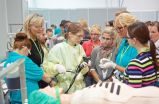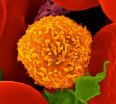Flu vaccine may hold key to preventing heart disease
A new study in Vaccine explains how flu vaccines prevent heart attacks
2014-10-21
(Press-News.org) Amsterdam, October 21, 2014 – Flu vaccines are known to have a protective effect against heart disease, reducing the risk of a heart attack. For the first time, this research, published in Vaccine, reveals the molecular mechanism that underpins this phenomenon. The scientists behind the study say it could be harnessed to prevent heart disease directly.
Heart disease is the leading cause of death worldwide. People can reduce their risk of heart disease by eating healthily, exercising and stopping smoking. However, to date there is no vaccine against heart disease.
Previous clinical findings show that people that receive the seasonal flu vaccine also benefit from its protective effect against heart disease; the risk of having a heart attack in the year following vaccination is 50% lower than people who did not receive the vaccination. The exact mechanism underlying this protective effect remained unknown.
This new study for the first time reveals this mechanism, showing that the flu vaccine stimulates the immune system to produce antibodies that switch on certain processes in cells. These processes lead to the production of molecules that protect the heart. The researchers say that based on the results it may be possible to develop a new vaccine against heart disease.
"Even though the protective effect of the flu vaccine against heart disease has been known for some time, there is very little research out there looking at what causes it. Our proposed mechanism could potentially be harnessed in a vaccine against heart disease, and we plan to investigate this further," said Dr. Veljkovic, Institute Vinca, Belgrade, the lead author of the new study.
The researchers identified a protein called the bradykinin 2 receptor (BKB2R), which is involved in cellular processes that protect the heart. Some of the antibodies the body produces after flu vaccination switch this protein on, therefore protecting against heart disease. The researchers analysed 14 flu viruses used in vaccines, and identified four that could be investigated for use in potential heart disease vaccines.
"The rate of administering flu vaccinations is disappointingly low, even in developed countries," added Dr. Veljkovic "We hope that our results will encourage more people to get vaccinated before the flu season starts."
INFORMATION:
This article is "Influenza vaccine as prevention of cardiovascular diseases: Possible molecular mechanism", by Veljko Veljkovic, Sanja Glisic, Nevena Veljkovic, Tijana Bojic, Ursula Dietrich, Vladimir R. Perovic, Alfonso Colombatti (doi: 10.1016/j.vaccine.2014.07.007). The article appears in Vaccine, published by Elsevier. http://www.sciencedirect.com/science/article/pii/S0264410X14009335
Notes for editors
Full text of the article is available to credentialed journalists upon request, contact newsroom@elsevier.com . Journalists wishing to interview the authors may contact Dr. Veljko Veljkovic at vv@vinca.rs.
About Vaccine
Vaccine is the pre-eminent journal for those interested in vaccines and vaccination. It is the official journal of The Edward Jenner Society, The International Society for Vaccines and The Japanese Society for Vaccinology. http://www.elsevier.com/locate/vaccine
About Elsevier
Elsevier is a world-leading provider of information solutions that enhance the performance of science, health, and technology professionals, empowering them to make better decisions, deliver better care, and sometimes make groundbreaking discoveries that advance the boundaries of knowledge and human progress. Elsevier provides web-based, digital solutions — among them ScienceDirect, Scopus, Elsevier Research Intelligence and ClinicalKey — and publishes nearly 2,200 journals, including The Lancet and Cell, and over 25,000 book titles, including a number of iconic reference works.
The company is part of Reed Elsevier Group PLC, a world-leading provider of professional information solutions in the Science, Medical, Legal and Risk and Business sectors, which is jointly owned by Reed Elsevier PLC and Reed Elsevier NV. The ticker symbols are REN (Euronext Amsterdam), REL (London Stock Exchange), RUK and ENL (New York Stock Exchange).
ELSE PRESS RELEASES FROM THIS DATE:
2014-10-21
Cosmologists have made the most sensitive and precise measurements yet of the polarization of the cosmic microwave background.
The report, published October 20 in the Astrophysical Journal, marks an early success for POLARBEAR, a collaboration of more than 70 scientists using a telescope high in Chile's Atacama desert designed to capture the universe's oldest light.
"It's a really important milestone," said Kam Arnold, the corresponding author of the report who has been working on the instrument for a decade. "We're in a new regime of more powerful, precision cosmology." ...
2014-10-21
The extinction in the wild of the southern white rhino population could be prevented by letting local communities take responsibility of the animals and giving them permission to harvest horns in a controlled manner through a legal trade. Rhino horn is made of the same material as human hair and fingernails and grows back in 2–3 years.
In 2013, more than 1000 rhinos were killed illegally for their horns in South Africa. Rhino horns are being used in Asia for traditional Chinese medicine and personal prestige. Now, a new study based on ecological and socio-economic ...
2014-10-21
NASA's newest orbiter at Mars, MAVEN, took precautions to avoid harm from a dust-spewing comet that flew near Mars today and is studying the flyby's effects on the Red Planet's atmosphere.
The MAVEN spacecraft -- full name Mars Atmosphere and Volatile Evolution -- reported back to Earth in good health after about three hours of precautions against a possible collision with high-velocity dust particles released by comet C/2013 A1 Siding Spring.
"We're glad the spacecraft came through, we're excited to complete our observations of how the comet affects Mars, and we're ...
2014-10-21
October 20, 2014 – (BRONX, NY) – Rates of depression and anxiety vary widely among different segments of the U.S. Hispanic and Latino population, with the highest prevalence of depressive symptoms in Puerto Ricans, according to a new report from Albert Einstein College of Medicine of Yeshiva University and the Hispanic Community Health Study/Study of Latinos (HCHS/SOL). The researchers' findings also suggest that depression and anxiety may be undertreated among Hispanics and Latinos, particularly if they are uninsured. The study was published online in Annals ...
2014-10-21
Our species' waking and sleeping cycles – shaped in millions of years of evolution – have been turned upside down within a single century with the advent of electric lighting and airplanes. As a result, millions of people regularly disrupt their biological clocks – for example, shift workers and frequent flyers – and these have been known to be at high risk for such common metabolic diseases as obesity, diabetes and heart disease. A new study published in Cell, led by Weizmann Institute scientists, reveals for the first time that our biological clocks ...
2014-10-21
Bethesda, MD (Oct. 21, 2014) — If you are not getting the recommended seven-to-eight hours of sleep each night, you may be at increased risk of developing ulcerative colitis, according to a new study1 in Clinical Gastroenterology and Hepatology, the official clinical practice journal of the American Gastroenterological Association.
"Both short and long durations of sleep have important health implications and are associated with increased overall mortality, cardiovascular disease and cancer," said lead study author Ashwin N. Ananthakrishnan, MD, MPH, Massachusetts ...
2014-10-21
A team of UC San Francisco researchers has found that a tiny segment of genetic material known as a microRNA plays a central role in the transition from moderate drinking to binge drinking and other alcohol use disorders.
Previous research in the UCSF laboratory of Dorit Ron, PhD, Endowed Chair of Cell Biology of Addiction in Neurology, has demonstrated that the level of a protein known as brain-derived neurotrophic factor, or BDNF, is increased in the brain when alcohol consumed in moderation. In turn, experiments in Ron's lab have shown, BDNF prevents the development ...
2014-10-21
(Vienna, October 21, 2014) Patients with irritable bowel syndrome (IBS) may at last be able to hope for a brighter future as innovative new treatments emerge and researchers clarify the role of current therapies. Dr Alexander C. Ford from the Leeds Gastroenterology Institute in Leeds, UK, tells journalists attending the 22nd United European Gastroenterology Week (UEG Week 2014) in Vienna, Austria, that significant progress was being made in drug development for IBS, thanks to the intense research efforts of scientists around the world. "Researchers have dedicated many years ...
2014-10-21
A new study shows that survival and neurological outcomes for patients in cardiac arrest can be improved by adding extracorporeal membrane oxygenation (ECMO) when performing cardiopulmonary resuscitation (CPR). The study abstract was released today in an online supplement of the journal CHEST and will be presented at CHEST 2014, the annual meeting of the American College of Chest Physicians in Austin, Texas held October 25-30.
Despite advances in medical care, less than 20% of people who experience a cardiac arrest make a full recovery. An alternate approach to traditional ...
2014-10-21
PROVIDENCE, R.I. [Brown University] — Scientists think of CD8 T cells as long-lived cells that become tuned to fight just one pathogen, but a new study finds that once CD8 T cells fight one pathogen, they also join the body's "innate" immune system, ready to answer the calls of the cytokine signals that are set off by a wide variety of infections.
Think of CD8 T cells as soldiers who are drafted and trained for a specific mission, but who stay in service, fighting a variety of enemies throughout a long career.
CD8 T cells therefore have more utility than researchers ...
LAST 30 PRESS RELEASES:
[Press-News.org] Flu vaccine may hold key to preventing heart disease
A new study in Vaccine explains how flu vaccines prevent heart attacks


